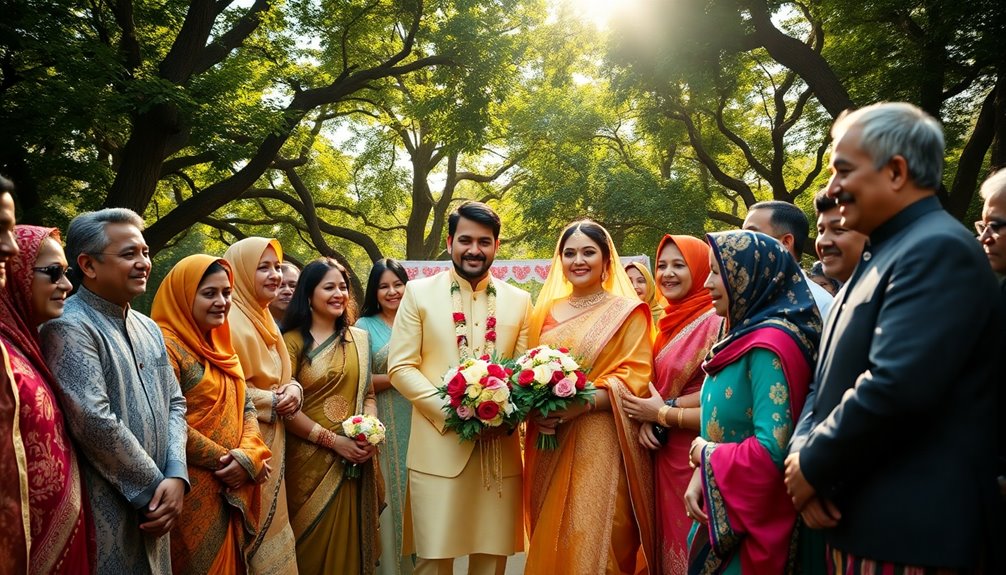The purpose of marriage goes beyond companionship; it's a sacred union designed for growth and support. It reflects spiritual principles, nurturing both partners and fostering deeper connections. In essence, marriage is a covenant that mirrors the relationship between Christ and the Church, emphasizing love and commitment. This bond promotes stability and resilience, creating an environment for raising future generations. As society's views on marriage evolve, its fundamental role remains crucial. If you want to explore how this ancient institution continues to shape lives today, there's so much more to uncover.
Key Takeaways
- Marriage serves as a sacred union for companionship, fostering emotional support and spiritual growth between partners.
- It reflects God's character and divine purpose, nurturing godly descendants within a stable family environment.
- The covenant aspect of marriage emphasizes mutual commitment and lifelong partnership, transcending mere legal contracts.
- Biblical principles guide marriage, highlighting faithfulness, companionship, and moral responsibilities toward future generations.
- Marriage enhances personal growth and resilience, providing a framework for deepening emotional connections and gratitude between partners.
Introduction

Marriage is often seen as more than just a legal contract; it's a sacred union designed for companionship, growth, and support. At its core, the purpose of marriage aligns with God's design, emphasizing the deep connection partners share. In Genesis 2:18, we see that God recognized the need for companionship, creating a partnership that allows you and your spouse to thrive together.
This divine institution goes beyond emotional satisfaction; it fosters spiritual growth and sanctification for both partners, as seen in Ephesians 5. Your marriage isn't merely a relationship; it's a reflection of the relationship between Christ and the Church, showcasing sacrificial love and unwavering commitment.
Moreover, a strong marriage can nurture godly descendants, providing a stable environment for children to learn essential values, as highlighted in Malachi 2:13-15.
The dynamics of marriage encourage personal growth and accountability, pushing you to face weaknesses and develop spiritually through shared experiences. Ultimately, understanding the purpose of marriage within God's design can transform how you view this sacred bond, guiding you toward a fulfilling and enriching partnership.
Biblical Marriage Principles

When you look at biblical marriage principles, you'll find that they're rooted in key scriptures that guide how you approach this sacred union.
Understanding these primary and secondary references can deepen your appreciation for the purpose and responsibilities of marriage.
Let's explore how these passages shape your view of companionship, faithfulness, and growth within this lifelong commitment.
Primary Bible References
The Bible provides foundational principles for understanding the purpose of marriage, emphasizing its role as a reflection of God's character and intentions. In Genesis 1:26-27, we see that God created man and woman in His image, highlighting that marriage mirrors divine qualities. This connection reinforces the idea that marriage is a sacred partnership designed to reflect God's love and unity.
Genesis 2:18 further affirms that companionship is essential, stating it's not good for man to be alone. Here, we learn that marriage serves as a vital support system for both partners.
In Ephesians 5:31-32, marriage is likened to the relationship between Christ and the Church, illustrating its spiritual significance and covenantal nature.
Malachi 2:13-15 emphasizes faithfulness, indicating that God desires godly offspring, thus showcasing marriage's role in nurturing future generations.
Finally, Hebrews 13:4 underscores the sanctity of marriage, calling for it to be honored and kept pure.
These scriptures collectively demonstrate that God created marriage not just for companionship, but as a profound commitment meant to reflect His character, uphold faithfulness, and nurture family life.
Secondary Bible References
A strong foundation for understanding biblical marriage principles can be found in several key scriptures that highlight its multifaceted purpose. In Genesis 2:18, God reveals it's not good for man to be alone, emphasizing that companionship and mutual support are essential in a marriage.
This partnership is further illustrated in Genesis 2:22-24, where the idea of becoming "one flesh" signifies the completeness you achieve together.
Proverbs 5:18 encourages you to rejoice in your marriage, reminding you that enjoyment plays a crucial role in your relationship. It's not just about duty; it's about delighting in one another.
Ephesians 5:25 calls you to love your spouse sacrificially, mirroring Christ's love for the Church. This protective role fosters a nurturing environment where both partners thrive.
Finally, Ephesians 5:31-32 draws a profound connection between marriage and the relationship between Christ and the Church. This highlights the spiritual significance of your union and calls for mutual respect and honor.
Marriage in Ancient Societies

Throughout history, marriage in ancient societies was more than just a romantic union; it functioned as a vital institution for forging alliances and ensuring continuity. In many cultures, like those in Mesopotamia and Ancient Egypt, marriage was a strategic way to secure heirs and maintain family lineage. This emphasis on procreation highlighted the importance of property ownership and social status.
In ancient Rome, marriage acted as a civil contract requiring mutual consent, often involving a dowry from the bride's family to the groom. This arrangement underscored the economic stability that marriage could provide. Furthermore, polygamy was prevalent among various ancient societies, allowing men to expand their labor force and lineage through multiple wives.
Religion played a significant role in these unions, with rituals designed to invoke divine blessings for fertility and prosperity. These ceremonies reinforced the idea that marriage wasn't merely a social contract but also a sacred bond, reflecting a deeper connection.
Ultimately, while you may see love as a cornerstone of marriage today, ancient societies viewed it as a complex network of relationships, often shaping the landscape of their communities, much like the relationship between Christ and the Church.
Cultural Views on Marriage

Cultural views on marriage have transformed dramatically over the centuries, shifting from economic and social arrangements to partnerships rooted in love and personal fulfillment.
In contemporary Western societies, you often see marriage as an institution that prioritizes individual happiness over collective family interests. This evolution reflects a broader understanding of Gods design for relationships, emphasizing personal growth and mutual respect.
Many modern cultures now encourage cohabitation before marriage, allowing couples to test compatibility and shared values prior to making a lifelong commitment.
This shift demonstrates a growing belief that personal choice and romantic love should take precedence over traditional norms. However, diverse cultural practices, like arranged marriages, still highlight the importance of familial approval and tradition in certain communities.
The rise of same-sex marriage in various countries further illustrates this change, showcasing a recognition of marriage as a fundamental right that transcends traditional gender roles. In recent years, celebrity couples exemplifying cultural fusion in relationships have become influential in promoting diverse views on marriage.
As cultural views on marriage continue to evolve, they increasingly embody a blend of love, commitment, and individual fulfillment, reflecting a more inclusive understanding of what partnership means in today's world.
Marriage Is Just a Contract

You might think of marriage as just a contract, focusing on legal terms and financial agreements.
However, this view can strip away the deeper significance of the union, leading to misunderstandings about commitment and expectations.
It's essential to recognize that marriage is meant to be more than a transactional arrangement; it embodies a profound partnership that reflects mutual growth and support.
Debunk Common Marriage Misconceptions
Marriage often gets misconstrued as nothing more than a legal contract, but this view strips away its deeper significance. It's fundamentally a covenant, rooted in God's intentions for relationships. This covenant emphasizes commitment and sacrificial love, as highlighted in Malachi 2:13–15.
Unlike a typical contract that can be easily terminated, marriage is a lifelong commitment that mirrors the relationship between Christ and the Church (Ephesians 5:31-32).
When you see marriage solely as a legal arrangement, you miss its spiritual essence. You're called to grow together in faith and character, as noted in 1 Thessalonians 4:3. Research shows that couples who embrace marriage as a covenant report greater satisfaction and stability in their relationships. Additionally, understanding the potential for financial stability post-divorce can motivate couples to work through challenges rather than view marriage as disposable.
This perspective nurtures a deeper connection, fostering resilience during challenges. The misconception of marriage as just a contract often leads to unrealistic expectations, resulting in dissatisfaction and increasing the likelihood of divorce when difficulties arise.
Recognizing marriage as a sacred covenant can transform your understanding and commitment, ultimately enriching your relationship. Embrace the depth of this covenant, and you'll experience the profound love and support it offers.
Marriage Lacks Legal Significance
In today's society, many people see marriage as just a legal contract, focusing on its formalities rather than the deeper emotional and spiritual connections it can foster. This perspective emphasizes rights and obligations, such as property rights, tax benefits, and next-of-kin status, often overshadowing the sacred idea of becoming one flesh. Critics argue that this reduction of marriage to a mere contract diminishes its sanctity and the seriousness of the commitment involved.
As you navigate relationships, consider how the perception of marriage as a legal contract can impact your views on love and commitment. With the rise of alternative arrangements like domestic partnerships and civil unions, emotional bonds can thrive outside the traditional marriage framework.
In some cases, jurisdictions even recognize cohabitation as a legal partnership, suggesting that you don't need a formal marriage license to validate your relationship. However, this shift may contribute to the higher divorce rate, as couples might enter and exit relationships with less seriousness.
Ultimately, reflecting on the true purpose of marriage can help you understand its significance beyond the legal contract—embracing the emotional and spiritual dimensions that make it meaningful.
Daily Relationship Check-Ins

Daily relationship check-ins are a great way to express gratitude and strengthen your bond.
By taking just a few minutes each day to acknowledge each other's efforts and celebrate small victories, you can enhance your emotional connection.
These moments also set the stage for deeper discussions, making it easier to address any concerns that arise.
Daily Gratitude Expressions
Expressing gratitude regularly can significantly boost relationship satisfaction. By incorporating daily gratitude expressions into your routine, you create an environment that fosters positive feelings and strengthens your emotional bond with your partner.
When you take time each day to acknowledge the little things your husband does, it not only enhances feelings of appreciation but also reinforces the love you share.
Engaging in these daily check-ins allows you to celebrate successes together and address any concerns that might arise, promoting open communication. Research shows that couples who practice gratitude daily experience higher emotional connection levels.
This simple act can transform your relationship dynamics, shifting focus from negativity to the positive attributes you both bring to the table.
Setting aside a few moments each day for gratitude discussions encourages teamwork and support, as you both recognize and value each other's contributions.
Ultimately, these expressions of thanks can mitigate conflicts and enhance overall relationship satisfaction. So, make it a habit to share what you appreciate about each other—it's a powerful way to nurture your marriage and deepen your husband's love.
Group Marriage Workshops
Group marriage workshops provide a valuable platform for couples to participate in daily relationship check-ins, fostering an environment of open communication and support.
These workshops encourage you to openly express your feelings, concerns, and needs, which is essential for a healthy relationship. By sharing your experiences with peers, you'll gain accountability, enhancing your commitment to one another.
Daily check-ins help you recognize patterns in your interactions. This awareness allows you to address issues proactively, strengthening your emotional connection.
In group marriage workshops, you'll engage in structured activities designed to improve your communication skills and conflict resolution strategies. These exercises lead to more fulfilling relationships, as they equip you with practical tools to navigate challenges.
Furthermore, regular check-ins cultivate an atmosphere of gratitude and appreciation. By acknowledging each other's efforts, you reinforce your bond and promote a positive marriage dynamic.
Ultimately, group marriage workshops serve as an invaluable resource, enabling you to deepen your connection with your partner while honing essential communication skills for a thriving relationship. Embracing this opportunity can transform your marriage into a more resilient and joyous partnership.
Marriage Reflects Divine Purpose

Marriage serves as a profound reflection of divine purpose, showcasing God's image through the union of man and woman. According to Genesis 1:26-27, you see that both were created to mirror His character and nature. This sacred bond illustrates the relationship between Christ and the Church, as Ephesians 5:31-32 reveals the depth of sacrificial love and commitment you're called to embody.
When you enter into marriage, you're not just forming a partnership; you're fulfilling God's intention for mutual love, respect, and support outlined in Genesis 2:18. This covenant challenges you to grow spiritually, as it often unveils personal flaws that lead to sanctification, aligning with 1 Thessalonians 4:3, where God said His will is for your growth.
Moreover, marriage has a divine purpose in nurturing godly offspring, as emphasized in Malachi 2:13-15. Through your family dynamics, you reflect God's intentions for relationships and values.
In all these ways, your marriage is a living testament to divine purpose, inviting you to actively participate in the greater narrative of God's love and commitment.
Additional Resources

To support your journey in fulfilling the divine purpose of marriage, various resources are available that can enhance your relationship. You might start by exploring insightful books like "The Meaning of Marriage" by Timothy Keller, which offers practical advice for couples seeking a deeper understanding of their union.
If you're facing challenges, consider professional counseling services that provide expert guidance to navigate marital issues effectively.
Additionally, workshops and retreats focused on marriage enrichment present opportunities to learn new skills and deepen your connection. These experiences can foster a greater understanding of each other, enriching your godly life together.
Online resources such as Focus on the Family and The Gottman Institute offer a wealth of articles, videos, and forums designed to support couples in their relationship journey.
Don't overlook community support, either. Joining church groups or marriage-focused organizations can provide encouragement, accountability, and fellowship as you strive to build a strong marriage.
Understanding the challenges of divorcing a partner with BPD can also provide insight into how emotional dynamics impact relationships and the importance of effective communication strategies.
Frequently Asked Questions
What Is the Purpose of the Marriage?
When you think about marriage, you might see it as a partnership where both of you support and uplift one another.
It's not just about love; it's about building a life together, sharing experiences, and growing as individuals.
You'll face challenges that test your bond, but through them, you'll learn more about yourselves and each other.
Ultimately, it's about creating a nurturing environment for any future children and fostering a deep, lasting connection.
What Is the Intended Purpose of Marriage?
When you think about the intended purpose of marriage, it's about creating a partnership that thrives on companionship.
It's meant to bring joy and support into your life, allowing both of you to grow together.
You're not just building a life; you're also nurturing a family, cultivating shared values.
This bond encourages accountability and personal development, while reflecting deeper connections, ultimately enriching your relationship and fostering an environment for love to flourish.
What Are the Three Objectives of Marriage?
The three objectives of marriage are companionship, completeness, and fruitfulness.
You find companionship in your partner, providing mutual support and friendship.
Completeness comes from the emotional, spiritual, and physical unity you share, becoming "one flesh."
Lastly, fruitfulness encourages you to procreate and raise children in a nurturing environment.
Together, these objectives foster a deep connection, fulfilling your needs and creating a loving family atmosphere that enriches your lives.
What Is the Main Reason for Marriage?
The main reason for marriage is companionship. You're not meant to go through life alone; having a partner creates a supportive bond that enriches your journey.
In this union, you find emotional stability, shared experiences, and someone to lean on during challenging times. This companionship fosters growth, love, and understanding, making your life more fulfilling.
Ultimately, it's about building a strong connection that enhances both your lives in meaningful ways.










